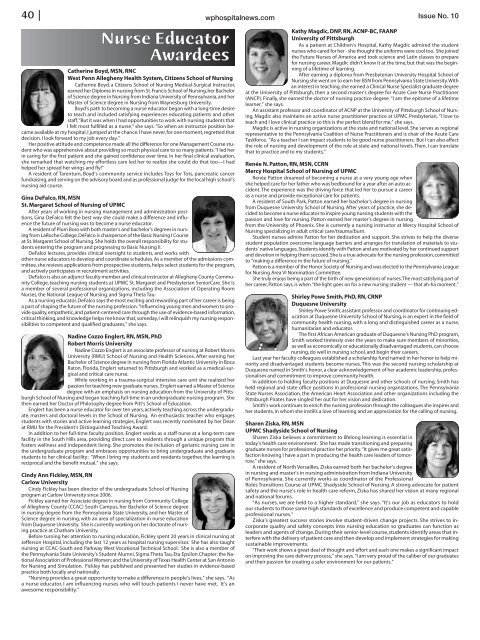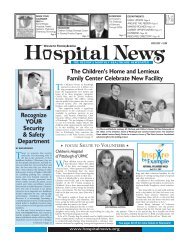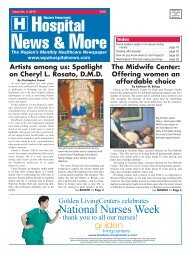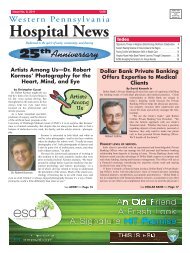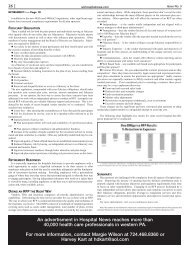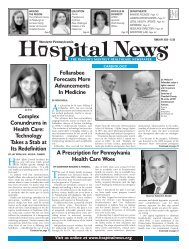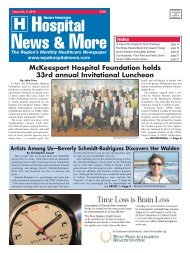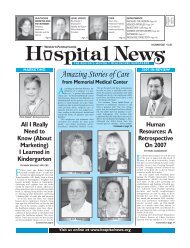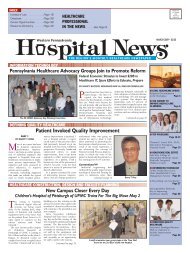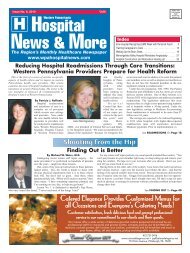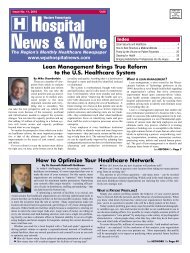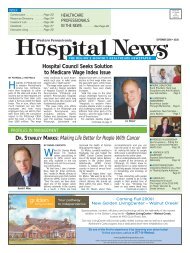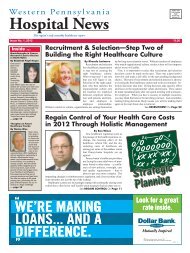Hospital News, 10-1-2011 - Western Pennsylvania Healthcare News
Hospital News, 10-1-2011 - Western Pennsylvania Healthcare News
Hospital News, 10-1-2011 - Western Pennsylvania Healthcare News
Create successful ePaper yourself
Turn your PDF publications into a flip-book with our unique Google optimized e-Paper software.
40 | wphospitalnews.comIssue No. <strong>10</strong>Nurse Educator Awardeesdvanced Practice AwardeesCatherine Boyd, MSN, RNCWest Penn Allegheny Health System, Citizens School of NursingCatherine Boyd, a Citizens School of Nursing Medical-Surgical Instructor,earned her Diploma in nursing from St. Francis School of Nursing, her Bachelorof Science degree in Nursing from Indiana University of <strong>Pennsylvania</strong>, and herMaster of Science degree in Nursing from Waynesburg University.Boyd’s path to becoming a nurse educator began with a long-time desireto teach and included satisfying experiences educating patients and otherstaff. “But it was when I had opportunities to work with nursing students thatI felt most fulfilled as a nurse,” she says. “So when an instructor position becameavailable at my hospital, I jumped at the chance. I have never, for one moment, regretted thatdecision. I look forward to my job every day.”Her positive attitude and competence made all the difference for one Management Course studentwho was apprehensive about providing so much physical care to so many patients. “I led herin caring for the first patient and she gained confidence over time. In her final clinical evaluation,she remarked that watching my effortless care led her to realize she could do that too—I hadhelped her spread her wings and fly!”A resident of Tarentum, Boyd’s community service includes Toys for Tots, pancreatic cancerfundraising, and serving on the advisory board and as professional judge for the local high school’snursing aid course.Gina DeFalco, RN, MSNSt. Margaret School of Nursing of UPMCAfter years of working in nursing management and administration positions,Gina DeFalco felt the best way she could make a difference and influencethe future of nursing was to become a nurse educator.A resident of Plum Boro with both master’s and bachelor’s degrees in nursingfrom LaRoche College, DeFalco is chairperson of the Basic Nursing I Courseat St. Margaret School of Nursing. She holds the overall responsibility for studentsentering the program and progressing to Basic Nursing II.DeFalco lectures, provides clinical oversight to students, and works withother nurse educators to develop and coordinate schedules. As a member of the admissions committee,she reviews applications from prospective students, helps select students for the program,and actively participates in recruitment activities.DeFalco is also an adjunct faculty member and clinical instructor at Allegheny County CommunityCollege, teaching nursing students at UPMC St. Margaret and Presbyterian SeniorCare. She isa member of several professional organizations, including the Association of Operating RoomNurses, the National League of Nursing, and Sigma Theta Tau.As a nursing educator, DeFalco says the most exciting and rewarding part of her career is beinga part of shaping the future of the nursing profession. “Influencing young men and women to providequality, empathetic, and patient-centered care through the use of evidence-based information,critical thinking, and knowledge helps me know that, someday, I will relinquish my nursing responsibilitiesto competent and qualified graduates,” she says.Nadine Cozzo Englert, RN, MSN, PhDRobert Morris UniversityNadine Cozzo Englert is an associate professor of nursing at Robert MorrisUniversity (RMU) School of Nursing and Health Sciences. After earning herBachelor of Science degree in nursing from Florida Atlantic University in BocaRaton, Florida, Englert returned to Pittsburgh and worked as a medical-surgicaland critical care nurse.While working in a trauma-surgical intensive care unit she realized herpassion for teaching new graduate nurses. Englert earned a Master of Sciencedegree with an emphasis on nursing education from the University of PittsburghSchool of Nursing and began teaching full-time in an undergraduate nursing program. Shethen earned her Doctor of Philosophy degree from Pitt’s School of Education.Englert has been a nurse educator for over ten years, actively teaching across the undergraduate,masters and doctoral levels in the School of Nursing. An enthusiastic teacher who engagesstudents with stories and active learning strategies, Englert was recently nominated by her Deanat RMU for the President’s Distinguished Teaching Award.In addition to her full-time faculty position, Englert works as a staff nurse at a long-term carefacility in the South Hills area, providing direct care to residents through a unique program thatfosters wellness and independent living. She promotes the inclusion of geriatric nursing care inthe undergraduate program and embraces opportunities to bring undergraduate and graduatestudents to her clinical facility: “When I bring my students and residents together, the learning isreciprocal and the benefit mutual,” she says.Cindy Ann Fickley, MSN, RNCarlow UniversityCindy Fickley has been director of the undergraduate School of Nursingprogram at Carlow University since 2006.Fickley earned her Associate degree in nursing from Community Collegeof Allegheny County (CCAC) South Campus, her Bachelor of Science degreein nursing degree from the <strong>Pennsylvania</strong> State University, and her Master ofScience degree in nursing, with an area of specialization in nurse educationfrom Duquesne University. She is currently working on her doctorate of nursingpractice at Chatham University.Before turning her attention to nursing education, Fickley spent 20 years in clinical nursing atJefferson <strong>Hospital</strong>, including the last 12 years as hospital nursing supervisor. She has also taughtnursing at CCAC-South and Parkway West Vocational Technical School. She is also a member ofthe <strong>Pennsylvania</strong> State University’s Student Alumni, Sigma Theta Tau, Eta Epsilon Chapter; the NationalAssociation of Professional Women; and the University of Texas Health Center at San Antoniofor Nursing and Simulation. Fickley has published and presented her studies in evidence-basedpractice both locally and nationally.“Nursing provides a great opportunity to make a difference in people’s lives,” she says. “Asa nurse educator, I am influencing nurses who will touch patients I never have met. It’s anawesome responsibility.”Kathy Magdic, DNP, RN, ACNP-BC, FAANPUniversity of PittsburghAs a patient at Children’s <strong>Hospital</strong>, Kathy Magdic admired the studentnurses who cared for her - she thought the uniforms were cool too. She joinedthe Future Nurses of America and took science and Latin classes to preparefor nursing career. Magdic didn’t know it at the time, but that was the beginningof a lifetime of learning.After earning a diploma from Presbyterian University <strong>Hospital</strong> School ofNursing she went on to earn her BSN from <strong>Pennsylvania</strong> State University. Withan interest in teaching, she earned a Clinical Nurse Specialist graduate degreeat the University of Pittsburgh, then a second master’s degree for Acute Care Nurse Practitioner(ANCP). Finally, she earned the doctor of nursing practice degree. “I am the epitome of a lifetimelearner,” she says.An assistant professor and coordinator of ACNP at the University of Pittsburgh School of Nursing,Magdic also maintains an active nurse practitioner practice at UPMC Presbyterian. “I love toteach and I love clinical practice so this is the perfect blend for me,” she says.Magdic is active in nursing organizations at the state and national level. She serves as regionalrepresentative to the <strong>Pennsylvania</strong> Coalition of Nurse Practitioners and is chair of the Acute CareTaskforce. “As a teacher I can impact students to be good nurse practitioners. But I can also affectthe role of nursing and development of the role at state and national levels. Then, I can translatethat to practice and to my students.”Renée N. Patton, RN, MSN, CCRNMercy <strong>Hospital</strong> School of Nursing of UPMCRenée Patton dreamed of becoming a nurse at a very young age whenshe helped care for her father who was bedbound for a year after an auto accident.The experience was the driving force that led her to pursue a careeras a nurse and provide exceptional care for patients.A resident of South Park, Patton earned her bachelor’s degree in nursingfrom Duquesne University School of Nursing. After years of practice, she decidedto become a nurse educator to inspire young nursing students with thepassion and love for nursing. Patton earned her master’s degree in nursingfrom the University of Phoenix. She is currently a nursing instructor at Mercy <strong>Hospital</strong> School ofNursing specializing in adult critical care/trauma/burn.Student nurses admire Patton for her dedication and support. She strives to help the diversestudent population overcome language barriers and arranges for translation of materials to students’native languages. Students identify with Patton and are motivated by her continued supportand devotion in helping them succeed. She is a true advocate for the nursing profession, committedto “making a difference in the future of nursing.”Patton is a member of the Honor Society of Nursing and was elected to the <strong>Pennsylvania</strong> Leaguefor Nursing Area VI Nomination Committee.She truly enjoys being a part of the birth of new generations of nurses. The most satisfying part ofher career, Patton says, is when “the light goes on for a new nursing student — that ah-ha moment.”Shirley Powe Smith, PhD, RN, CRNPDuquesne UniversityShirley Powe Smith, assistant professor and coordinator for continuing educationat Duquesne University School of Nursing, is an expert in the field ofcommunity health nursing, with a long and distinguished career as a nurse,humanitarian and educator.The first African American graduate of Duquesne's Nursing PhD program,Smith worked tirelessly over the years to make sure members of minorities,as well as economically or educationally disadvantaged students, can choosenursing, do well in nursing school, and begin their careers.Last year her faculty colleagues established a scholarship fund named in her honor to help minorityand disadvantaged students become nurses. This was the second nursing scholarship atDuquesne named in Smith’s honor, a clear acknowledgement of her academic leadership, professionalismand commitment to improve community health.In addition to holding faculty positions at Duquesne and other schools of nursing, Smith hasheld regional and state office positions in professional nursing organizations. The <strong>Pennsylvania</strong>State Nurses Association, the American Heart Association and other organizations including thePittsburgh Pirates have singled her out for her vision and dedication.Smith's work continues to enrich the nursing profession through the colleagues she inspires andher students, in whom she instills a love of learning and an appreciation for the calling of nursing.Sharen Ziska, RN, MSNUPMC Shadyside School of NursingSharen Ziska believes a commitment to lifelong learning is essential intoday’s health care environment. She has made transitioning and preparinggraduate nurses for professional practice her priority. “It gives me great satisfactionknowing I have a part in producing the health care leaders of tomorrow,”she says.A resident of North Versailles, Ziska earned both her bachelor’s degreein nursing and master’s in nursing administration from Indiana Universityof <strong>Pennsylvania</strong>. She currently works as coordinator of the ProfessionalRoles Transitions Course at UPMC Shadyside School of Nursing. A strong advocate for patientsafety and the nurse’s role in health care reform, Ziska has shared her vision at many regionaland national forums.“As nurses, we are held to a higher standard,” she says. “It’s our job as educators to holdour students to those same high standards of excellence and produce competent and capableprofessional nurses.”Ziska’s greatest success stories involve student-driven change projects. She strives to incorporatequality and safety concepts into nursing education so graduates can function asleaders and agents of change. During their senior-level course, students identify areas that interferewith the delivery of patient care and then develop and implement strategies for makingsustainable improvements.“Their work shows a great deal of thought and effort and each one makes a significant impacton improving the care delivery process,” she says. “I am very proud of the caliber of our graduatesand their passion for creating a safer environment for our patients.”


